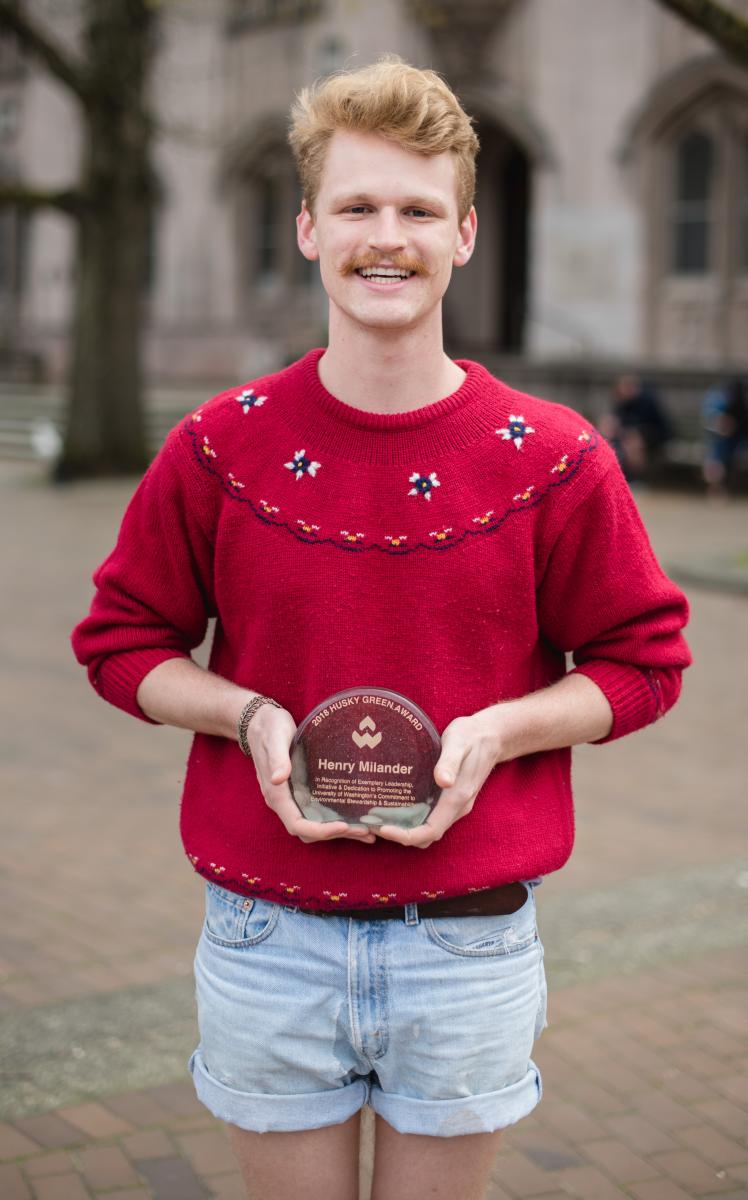
Henry Milander has always held an interest in sustainability. He spends many Saturday mornings with hands in the dirt, removing invasive plant species and cleaning up local parks through UW Rotaract. Social issues are well on his radar, too; Henry often volunteers his time at organizations that train disadvantaged individuals in culinary arts, and others that alleviate food insecurity.
Henry is pursuing degrees in Business Administration (Finance), International Studies and Near Eastern Languages and Culture at UW. While pursuing these degrees, he gained an insight on how corporate practices impact consumers and the environment. This new knowledge also led to a growing interest in Corporate Social Responsibility (CSR). However, he didn't fully know how to connect his interests around business, environment and society until a trip abroad to Denmark.
Henry jumped on the chance to study Scandinavian CSR in Copenhagen, which stresses the importance of social and environmental concern in business operations. On the trip, the fundamental differences between Scandinavian culture and our own made a deep impression on Henry. He saw Scandinavian businesses prioritize people and environment over profit, yet somehow manage to find the delicate balance between positive impact and fiscal growth. At the same time Scandinavian citizens are often rated - and seemed to be - one of the happiest populations in the world. He thought the business people of this region were doing something right, helping cultivate quality of life rather than hurting it. The importance of corporate responsibility then became clear, and emboldened Henry to do all he could to share his new knowledge back at the UW.
 The work he did when returning to Seattle earned him a 2018 Husky Green Award. The Husky Green Awards awards are given annual to students, staff, faculty and groups at UW who show dedication, initiative and leadership in sustainability.
The work he did when returning to Seattle earned him a 2018 Husky Green Award. The Husky Green Awards awards are given annual to students, staff, faculty and groups at UW who show dedication, initiative and leadership in sustainability.
This year, Henry served as president of the Certificate of International Studies in Business' (CISB) Executive Committee. The mission of CISB is to "prepare undergraduate students to become leaders in a globally interdependent and culturally diverse business world." Members immerse themselves in the business practices of the cultures they visit by taking part in study abroad opportunities presented by the program. As president, Henry works with the staff and students of the Foster's School of Business to mesh sustainability, CSR and business ethics into a cohesive foundation for learning. At its core, the intersectional nature of CISB integrates key ideals of environmentalism and social ethics into the professional development of business students.
Henry has also been hard at work to make sure sustainability stays at the forefront of CISB's values. He recently had the club participate in UW Sustainability's Green Dawg Certification, and CISB received a Purple certification level. After taking into account advice Green Dawgs consultants gave him, he began working to add a Sustainability and Ethics chair to CISB's committee. Receiving a commendation like the Husky Green Award hasn’t made Henry lose sight of the need to keep pushing for responsible practice in business.
"I think in general the business world engages with sustainable ideologies superficially - that is, doing certain things sustainably while as a whole at least partially exacerbating economic inequality, environmental impact, and social marginalization," he said. "I worry that the system these businesses compete in does not incentivize or sufficiently value responsible business practices."
Henry notes that when corporations prioritize profit margins, the CSR and sustainability values they claim to adhere to often fall by the wayside. To spark conversations around this issue, he recently co-organized the April 4th Global Leadership Summit. Working with the Global Business Center and UW Sustainability, Henry created an informational event covering responsible practices in business, technology, environmental policy, and health. The forum itself was formatted to create learning opportunities between students and current business leaders though dialogue. Speakers from Starbucks, Microsoft, the Evans School, the Bill and Melinda Gates Foundation and more provided a venue for collaborative case studies that gave attendees a firsthand account on how business engages with sustainable methodologies.
Though Henry has been concentrating on CSR he hasn't lost his love of getting down in the dirt for Earth, or lending a helping hand to those in the local community. He frequently participates in local park restoration through EarthCorp and food repackaging through Rotary First Harvest. He also participates in fundraisers running parallel to his work with CISB, mainly through donations to subsidize education in Africa and South America.
When we talk about sustainability on campus, conversations usually revolve around being green, renewable energy, recycling, and the like. These dialogues are important in developing UW's role as a leader in environmental steward, but can leave out the ideas needed to develop equity in our local community.
"Sustainability means and equitable livelihood for everyone, and the end to exploitation of natural resources at the expense of many for the benefit of a few," he said. "I don't see a future in which people don't truly feel they have an equitable chance in life, whether that is in education, housing, employment, and so on. Sustainability means making progress on these ever-increasing social issues, while at the same time bringing our material consumption in line with what our planet can realistically provide without jeopardizing its use for future generations."